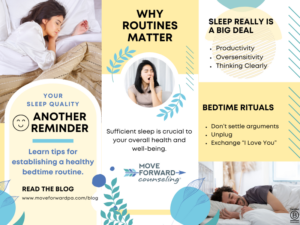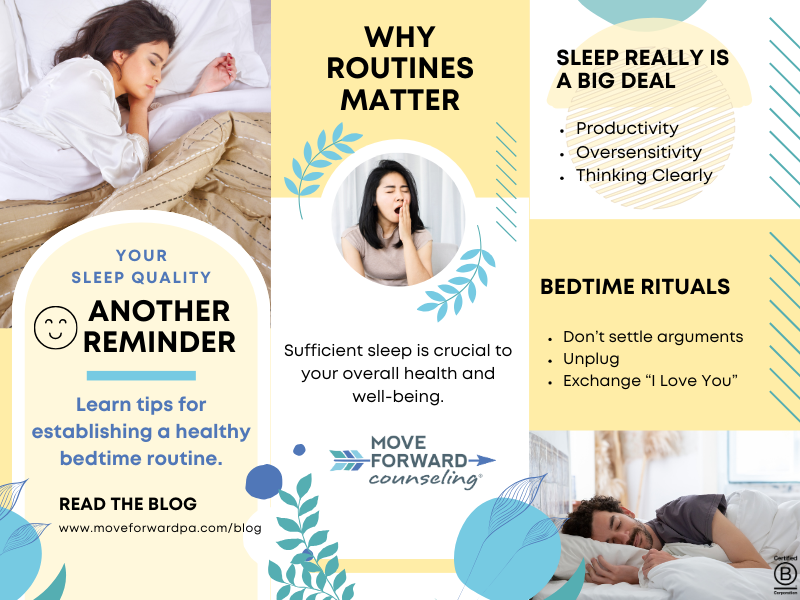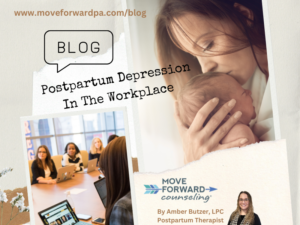Why Healthy Bedtime Routines Matter: Ideas For Your Bedtime Routine
It Really is a Big Deal
Good quality and sufficient sleep are crucial to your overall health and well-being, yet many of us disregard the importance of this daily need. We frequently put off sleep to accomplish tasks or have quality time with loved ones. When the reality is good sleep helps us be more productive and be the best version of ourselves. This is why healthy bedtime routines matter.
Think about it. When you don’t get enough sleep, how do you feel? It is harder to focus and think clearly about tasks; we are moody and oversensitive to situations that normally wouldn’t be a big deal; we eat more; we gain weight; we have more feelings of depression and anxiety, and we don’t feel as good as we could.
Healthy Bedtime Rituals
Good sleep begins with healthy bedtime rituals. Spending time with the people we love before we sleep can be a smart way to close the day, let go of stress, and rest peacefully.
Whether cuddling with a child, a bedtime kiss, laughing and talking with a spouse, or feeling physically or emotionally connected to those we love, these can decrease cortisone levels and stress-related health risks. It is a routine that everyone in the home can look forward to, and it is an excellent way to put some finality into the day…to know you are not alone in this busy life and tomorrow is a new day.
The Cortisol Factor
A psychological scientist at Wayne State University explored the link between cortisol levels—the stress hormone—and physical health. Cortisol is present in nearly every body cell, impacting learning, memory, and emotion. It also helps to regulate the immune system. The scientist Richard Slatcher found that the more connected to their relationships people felt, the healthier their cortisol levels were. (Similarly, read about Dr. Slatcher’s research on marital relationships, hormones, and stress.)
Some ideas for a healthy bedtime routine may include:
- Exchanging “I love you.” This is a good habit to get into because as much as we feel we don’t need always to say it, it helps to hear it and know your children or partner means it. It is healthy for everyone.
- Go to bed at the same time as your partner. This provides time to reconnect, even if only for a few minutes. It is time when it is just the two of you. Even if it is a few exchanges about your day or some more intimate cuddle time, maybe a laugh or two, it is a good, healthy habit and keeps you both on the same page.
- Unplug. The bed is not the place for your phone or laptop. Leave that stuff at the door. This is the time for you, your partner, and your children.
- Prioritize getting a good night’s rest. Try to go to bed early enough to get ample sleep. Better sleep means better mental and physical health and better handling of stressful situations.
- Don’t try to settle arguments. The old saying “Don’t go to bed angry” is not always true. Not everything must be fixed before getting some shuteye. Sometimes, it can be better to get some good rest and then reassess in the morning when you are refreshed and focused.
- Take a few minutes to practice gratitude. Think about one good thing in your day and share it with your partner or kids. It will leave the day happy and improve overall mental health.
Your Body’s Natural Rhythm
It is also important to limit caffeine and alcohol intake and screen time in the hours leading up to bedtime. Keep your bedroom cool and as dark as possible. Keep a consistent sleep schedule, even on the weekends and holidays, to help your body’s natural rhythm.
Good quality sleep should be just as much a priority as going to work every day and eating healthy foods. You need to take care of yourself before you can truly care for others.
How to Seek Help with Sleep
If your lack of sleep is related to your experience with overwhelming thoughts, depression, relationships, or other life transitions and stressors, maybe counseling can help. Contact us to explore therapists who may be a good match for you. You can also chat with our scheduling team right here on our website.





























